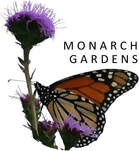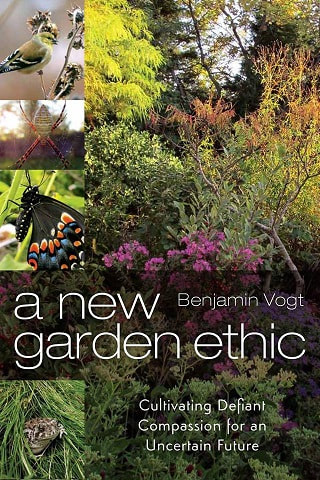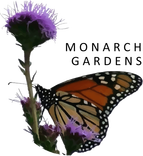- Identify the species. Is it a generalist or specialist? Native or exotic? Is it gathering pollen or using nectar.
- What else is in bloom nearby? Nearby means with a few yards, the entire garden, and at least several city blocks. Maybe there's no better option?
- Get out your chemistry set -- what's the nutritional make up of the pollen and / or nectar? Is it "better" or not? Is it what that adult species requires?
- What habitat does this insect need to thrive in? Is that available on site or nearby? Habitat for nesting etc.
- Does the insect requires a host plant for its larvae, and are those available?
And I want to say this, too, which I explore in A New Garden Ethic: when we use casual observations to justify our beliefs, that does not a peer-reviewed-and-replicated-study-in-you-region make. No matter where you fall on the plant origin spectrum, observation is just step one.
A common argument is, again, that we've so altered the world that plant diversity is key to supporting wildlife and adapting to all the changes we've caused. That's hogwash. It's also a defense of human privilege and supremacy, aka greenwashing, and an avoidance of critical thinking and certainly empathy for other species -- and it's totally ignoring that we need to dismantle the extractive, colonizing systems that CONTINUE TO ERODE LIFE (systems of which mainstream horticulture is a part of). Was that a lot? It's in the book, and we go through it a lot slower there in those pages if you're willing to take the ride.
Native plants HELP SPECIES ADAPT TO CLIMATE DISRUPTION. It gives them a fighting chance. It gives evolution a very small window to do its thing (see book). Most species can't and won't evolve within decades as climate disruption speeds along faster and faster. But this belief that we know better (human supremacy) than millenia of co-evolution is a little absurd, disgusting, and racist toward other species. That's right. Because another thing you'll often hear is that native plant proponents are racist, practicing some sort of eugenics by privileging plant species local wildlife have evolved with. No, it's racist to violently colonize a place, to replace a culture with another, and assume you are better, that what you do is benign, and that gardens are privileged art and thus natural and thus devoid of having any sort of environmental responsibility. (Did I mention a certain book?)
For a long time horticulture has been a colonizing force -- just consider the global plant trade, or how many invasive plant species are escapees from gardens. Plants are also often named after white males who "discovered" them. It's systemic human (and white and classist)) privilege, and until horticulture reckons with its hand in colonialism -- of humans and ecoregions -- any discussion about native vs exotic plants is just a pecking on the surface (Star Wars reference!).
The real conversation about indigenous plant species is about running roughshod over other cultures, human and plant and animal, and being unwilling or unable to notice and process the repercussions because they "make us feel bad" or feel too much like "shaming" (also something you'll hear a lot in reference to climate change and social justice anything for POC or the LGBTQ community or sick people or old people). Often, when someone feels shamed it's because they're being asked to do some difficult introspection that confronts a comfortable, self-defining ideology or dogma (which can occur all over the plant origin spectrum) that, when destabilized, makes us feel unmoored and lost. Again, A New Garden Ethic flushes this all out (it was published 6 years ago and is in its fourth printing, fyi).
This is hard work. It will make us feel very uncomfortable. It's good that it does. It's natural. And it's necessary if we are to grow. Confronting systems of privilege and power will never be without pain -- and that's exactly what native plants are about, whether we know it or not. Native plants don't bring division to horticulture -- horticulture does by privileging aesthetics for one species over what the rest of the planet needs, and doing it via violent colonization. Native plants are just the spotlight brought to bare on some uncomfortable realities we'd prefer to remain under the rug. To some, that makes native plant proponents feel doubly threatening -- not just that they are about "limiting" plant choices for a privileged species (natives aren't really limiting), but that the discussion is also about the systems in place that we lash on to which provide stability to our reality; just when we thought we had something figured out, it proves to be more complicated. But c'est la vie -- and thank god, too, because it's exciting to learn and grow. We are gardeners, after all, and the lessons never, ever end.
So I ranted. It's an opinion. A very different one, probably, and one that has irked plenty for around 10 years now. There's plenty to agree and disagree with, which I'm sure you will below -- just keep it civil please or we'll delete / close comments.
TLDR ---- Above all else I want this to be where we come together to think critically and evolve our thinking in the garden: we all value plants, we all honor and treasure them and the wildlife we see using them. But it's long past time to deeply and fully explore the ramifications of gardening, the connections it has to larger socially systemic issues within and beyond our species, and how gardening as we've known it is no longer tenable -- and that's exciting and hopeful, not something to be angry or depressed over (at least not for any longer than we have to be to cultivate change -- see the book when it explores the five stages of environmental grief and how we're all processing grief right now).


 RSS Feed
RSS Feed

